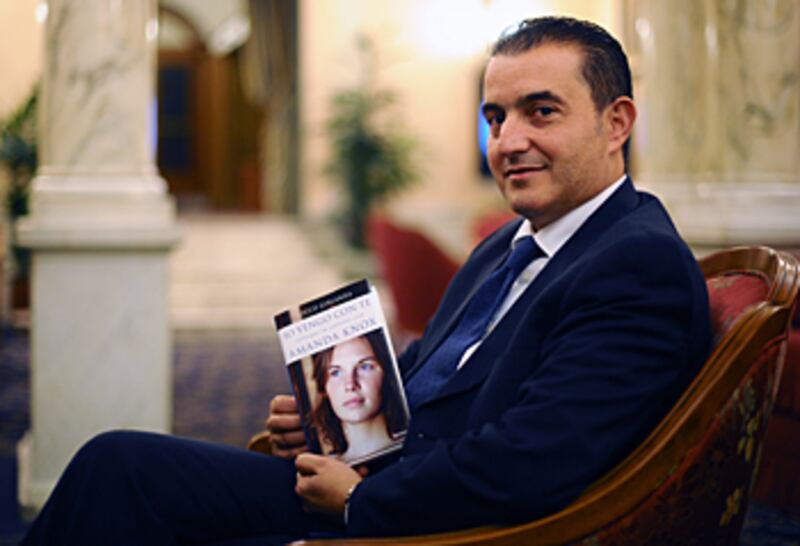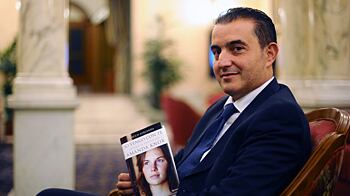Italian parliamentarian Rocco Girlanda’s says his goal in seeking out Amanda Knox was to find out how a young woman the same age as his own daughter could be all about “sex, drugs and rock ‘n roll.” What he found, he says, is a young woman who is nothing like the headlines.
His new book, Io Vengo Con Te: Colloqui in Carcere con Amanda Knox (Take Me With You: Conversations with Amanda Knox in Prison), chronicles a year of conversations and letters with Knox, currently serving 26 years in an Italian prison for the murder and sexual assault of Meredith Kercher. Girlanda is a member of Silvio Berlusconi’s ruling party and president of the Italy-USA Foundation, which fosters ties between the two nations. He used his professional privilege as a parliamentarian to visit Knox in prison without having to go through the regular visitation channels.

The book, which grew out of 20-odd visits with Knox, is an almost-too-intimate account of the 45-year-old Girlanda’s interactions with the 23-year-old Seattle native during that time. He gushes over Knox’s “intense blue eyes” and describes how he blushed when she asked him for a hug after he brought her a computer as a gift, courtesy of the Italy-USA Foundation. “Can I hug you?” Knox asked after he told her about the computer. “A hug: a request I was not expecting,” he writes before describing his embrace with her. “I blushed…She holds me and I hold her. It seemed like a neverending hug, without a single word spoken.”
Girlanda admits that it “wasn’t my first dream about Amanda. And it won’t be my last.”
Girlanda’s is the latest in a string of books written about Knox (including one by this author.) But rather than recount the crime, murder investigation, and court case, Girlanda offers a look at Knox as a person, not just a convicted murderess. Girlanda kept a diary of their prison conversations and Knox wrote letters and poetry to him, which he uses to give the enigmatic American a real voice. His book is peppered with expressions like “Wow!” and “That’s great!” and he describes her by turns as “curious” and “eager.”

Their conversation hinges on the banal at times, discussing the name Knox, as in “Fort Knox” and “Knox Memorial Bridge” in Florida. She refuses to discuss her current cellmate, also an American, except to say they are friends. And he does not ask her about the murder of Meredith Kercher. The only time Kercher’s name appears is when Knox recounts how the discovery of “Meredith’s case” interrupted her plans to go on a day trip with Raffaele Sollecito, her former boyfriend and accomplice.
But Girlanda does manage to shed light on Knox’s typical day in prison. She doesn’t like to watch television, instead preferring to read until nearly midnight every night. The parliamentarian had some long, meaningful conversations with Knox, he writes, during which they talked about her hopes and dreams. She wants to get married and even adopt children one day. She is more “spiritual” than “religious.” She misses her family dog. And her political views and support for Barack Obama are clearly liberal – a point of contention with Girlanda, a staunch right-wing conservative. They also spoke about music and literature at each meeting, and Girlanda brought her a selection of reading material ranging from novels by Ken Follett and Dan Brown to operas by Moravia.
Girlanda also recalls his own dreams, in which he and Knox are sitting in a taxi crossing a bridge heading toward JFK Airport in New York City. She hands him her pink iPod, which is full of Beatles songs. They talk about bicycle riding and truffle hunting in Umbria. Their conversation goes on for several minutes as they drive the periphery of New York. “The dialogue continues until I wake up in my bed in my house in Gubbio,” he writes. “Then I realized that my journey in the American taxi together with Amanda was only a dream.“
Girlanda admits that it “wasn’t my first dream about Amanda. And it won’t be my last.”
Not everyone agrees with the idea of a parliamentarian writing a book about a celebrity prisoner while ignoring the plight of scores of others, and Girlanda admits the conflict. He says he tried to greet as many Italian prisoners as he could on his way to Amanda’s cell each time he visited. A member of the opposition party asked why Girlanda didn’t also spend time talking to Sollecito and Rudy Guede, a third man convicted in Kercher’s murder. Francesco Maresca, attorney for the Kercher family, called Girlanda’s book opportunistic. “Girlanda did not attend the trial or review the evidence,” he said. “To be profiteering by capitalizing on visits with a young woman in prison seems inappropriate for a member of parliament.”
Knox’s parents, who were to be in court facing slander charges the day Take Me With You was released, hope that Girlanda’s book will help sway public opinion of their daughter. "We have been trying throughout this whole process to portray Amanda the way we know her and now there's somebody actually from Italy who's gotten to spend time with her," Curt Knox told ABC News. "We're hoping this will change some minds."
The next book out is by Maria D’Alia, an Italian journalist with Radiotelevisione Italiana who has written about the discrepancies in evidence. Her book will be released around the time of Knox’s first appellate hearing November 24. But Knox, according to Girlanda, does not revel in her fame. “It’s not like I’m Angelina Jolie,” she tells the parliamentarian. “It’s ugly to be famous for this.”
Barbie Latza Nadeau, author of the Beast Book Angel Face, about Amanda Knox, has reported from Italy for Newsweek Magazine since 1997. She also writes for CNN Traveller, Budget Travel Magazine and Frommer's.






